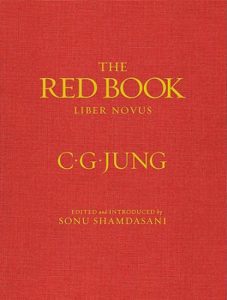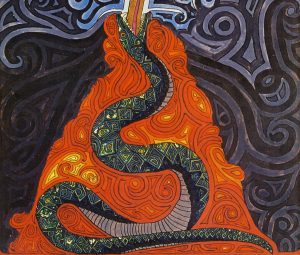
Starting on 1 November 2019 The Jungian Book Club will be reading The Red Book. In line with the unique and profound nature of this text, to understand its true meaning and to unlock it as a process and map for soul exploration this will be offered in the form of a structured and facilitated online programme.
This study is not only of the journey of exploration that Jung took in his encounter with his own unconscious, but, significantly, to allow you the reader to follow along the same path and process that Jung undertook and recorded in the Red Book. This is done with the goal of creating your very own “Red Book”. The Red Book is not simply a text, but a road map to self-exploration. The only way to truly understand the meaning of the text is to travel the journey that Jung underwent and recorded in his Red Book (Liber Novus). At the end of the course, you will have your own “New Book” that captures your own mythos and inner world in a tangible and meaningful form and a deeper appreciation of this profound text.
Who this programme is for
Entry is open to anyone wanting to deepen their understanding of Jungian psychology, Carl Gustav Jung, the person, or embark on the creation of their own “New Book” and map of the soul. No previous experience or reading in the field is required and all necessary reading material will be provided. That noted, this programme and process is ideally suited to the psychologically and emotionally mature reader- it will charter a course not dissimilar to the one Jung undertook on his own inner journey; and some familiarity with the Jungian lexicon, whilst not essential, will aid you on this journey.
What this programme includes
An overview and synopsis of the book.
A section by section, detailed and hermeneutic reading of the text.
Applications for those interested in engaging their own creative daemon (finding their own Philemon) and working on the creation of their own soul map.
Links to other studies, lectures and videos that expand on the reading of the text.
Live webinars – recorded for the benefit of those unable to attend live.
Participation in a facilitated Facebook forum set up expressly for this purpose, where you will be able to engage with other students from around the world, post any questions or thoughts you have on the text and your own creative work, should you be inclined to do so.
What you will need
- A journal
- Sketchbook, and tools for making art (watercolours, pastel crayons, etc.).
- Access to Internet and Facebook
- To keep track of your own dream life and unconscious processes in a manner similar to Jung.
- NB. You will not need a copy of the Red Book. – Obviously for those who have one, either the full illustrated version or the readers edition, these are wonderful accompaniments and a privilege to have. However, the reading and the course designed is set up in such a way that that owning your own copy of the book is not an essential prerequisite for participation. All texts under consideration will be shared with you as part of the course.
Course objective
Our goal is to study the Red Book more as a map and less of a text. In other words, it’s one man’s document detailing his exploration of his unconscious. Therefore, to grasp the Red Book one must undergo their own exploration and learn how to chart the waters of their own unconscious psyche. The Red Book is only able to be comprehended in such a fashion. The other part of understanding the Red Book is understanding Jung as much as possible biographically. Through this process of inner exploration, students will be able to chart a map of their own unconscious in a fashion similar to Jung.
Course outline
Module 1: The context and backdrop: Jung’s crisis
Readings: ‘Memories, Dreams, Reflections.’ ‘Carl Jung: Wounded Healer of the Soul.’
Module 2: Crisis of the Soul: The universal experience
Exercise: student writings or art exploring themes of personal crisis
Module 3: Jung and his confrontation with the unconscious: Jung in the House of Mars.
Readings: Red Book
Module 4: Building relationship with the unconscious: Perspectives and Methods
Exercise: Active Imagination and recordings
Module 5: The Fall: Jung’s experiences with the unconscious as shaped by the Bible, Faust, and Dante.
Readings: Answer to Job. The Red Book
Module 6: Working with the unconscious: Building your own book
Exercise: Methods of recording and working with unconscious contents
Module 7: The seeds and symbols: Jung’s theory as it develops in the Red Book
Readings: The Red Book
Module 8: Affect, Complexes, and Archetypes: The power of naming and map making

Exercise: naming and engaging the unconscious contents
Module 9: Confronting Jung: Mystic, Psychotic, Cult Leader, and Healer?
Readings: The Red Book, The Aryan Christ: The Secret Life of Carl Jung
Module 10: Mythos: A personal myth as discovery
Exercise: Claiming your myth discovered in the unconscious
Module 11: Exploring the symbols and art of Jung’s unconscious
Readings: The Red Book
Module 12: Conclusions and enduring mysteries
Exercise: The unfinished work
Registration
Commencing: 1 November 2019
Duration: six months
Tuition Fee: $19 pm
For anyone joining unable to subscribe via PayPal, you have the option of a once off fee for the six months, paid via EFT (internet banking). For an invoice with payment details email Jess at admin@appliedjung.com
Course presenters
Shane Eynon, Ph.D. Licensed Psychologist Education: Temple University Residency: Moss Rehab/Einstein Hospital – Child Neuropsychology Dr Eynon had served 12 years on Active Duty in the military as a Psychologist. He achieved the rank of Commander before returning to civilian practice. During his time in the military he served on faculty for the U.S. Navy’s APA internship at the National Naval Medical Center, Bethesda, MD. He deployed as a neuropsychologist with the Marine Corps to Afghanistan in 2010 serving at the UK’s Trauma Center at Camp Bastion and Camp Leatherneck. During his military career, Dr Eynon developed programs for PTSD, Suicide Intervention, Traumatic Brain Injury and Neuro-developmental Disorders. His interest in Jungian Psychology evolved as he underwent 5 years of Analysis and supervision with an IAAP trained Jungian Analyst to overcome symptoms of PTSD. During his Bachelor level training for his undergraduate degree, Dr Eynon was selected to attend the highly prestigious Tyler School of Art in Philadelphia, PA. There he trained in multi-media art with a concentration in Drawing and Fine Art Painting.
Stephen Anthony Farah, MA, is the co-founder and head of learning for The Centre for Applied Jungian Studies South Africa. He is an executive member of the International Association of Jungian Studies. Stephen co-chaired the IAJS conference The Spectre of the Other in Jungian Psychology in Cape Town in 2017. He holds an honours degree in analytical philosophy, from the University of the Witwatersrand and a Masters degree in Jungian and Post Jungian Studies, from the University of Essex. Stephen published True Detective and Jung’s Four stages of Transformation in The Routledge International Handbook of Jungian film Studies, (2018) and co-edited a journal of the International Journal of Jungian Studies of papers from the 2017 IAJS conference. Stephen’s areas of interest include psychoanalysis, film, the philosophy of language, consciousness, individuation and the simulation hypothesis. He is a pioneer in the field of Applied Jungian Psychology and has developed many programmes both online and real world for the dissemination of Jungian psychology outside of its traditional structures, including: The Twelve Steps towards Individuation, Magnum Opus and Jungian and post-Jungian Clinical Concepts.

